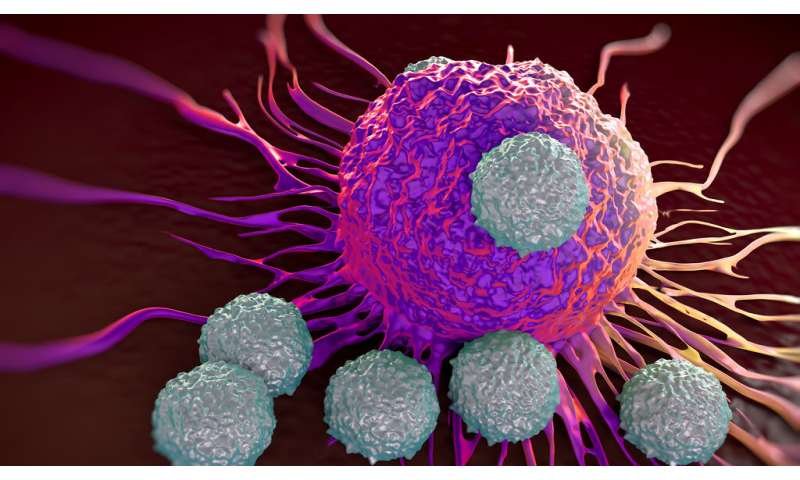New tool identifies which cancer patients are most likely to benefit from immunotherapy


A new diagnostic tool that can predict whether a cancer patient would respond to immunotherapy treatment has been developed by scientists at the University of Bath. This advance in precision medicine will allow clinicians to tailor treatments specifically to patients and avoid treatment paths that are unlikely to be successful.
Immunotherapy is a type of cancer treatment that helps a patient’s immune system fight cancer and is having a profoundly positive impact on cancer treatments. Cancers evade detection by the immune system, making themselves invisible to the natural anti-tumor response and actively blocking it.
One type of immunotherapy, called immune checkpoint inhibitors, are antibodies that remove the brakes which the tumor has applied to the immune system. This re-activates the patients’ natural anti-cancer response, which then destroys the tumor.
Whilst checkpoint inhibitor immunotherapy is very successful in some patients, in others it has little or no effect. Given the inherent toxicity risks in these treatments, there has been a growing need to define which patients are most likely to benefit, avoiding unnecessary exposure to those who will not.
Researchers in Bath led by Professor Banafshé Larijani Director of the Centre for Therapeutic Innovation (CTI-Bath), working with other colleagues and the company FASTBASE Solutions Ltd, have now developed a prognostic tool using an advanced microscopy platform that identifies immune cell interactions with tumor cells and also reports on the activation status of immune-checkpoints that dampen the anti-tumor response.
The team published its findings in Cancer Research, a journal of the American Association for Cancer Research.
The team studied an immune checkpoint consisting of two proteins termed PD-1 (present on immune cells called T lymphocytes) and PD-L1 (present on other types of immune cells and on the surface of many different types of tumours).
Ordinarily, when PD-1 on the surface of T lymphocytes engages with PD-L1 on the surface of other immune cells, it effectively switches off the immune function of the T cell. In a healthy individual, these checkpoints tightly regulate the body’s immune response, acting as an off-switch to prevent autoimmune and inflammatory disease.
Tumor cells essentially hijack this mechanism by expressing PD-L1 on their surface enabling them to activate PD-1 on the T lymphocyte, thus switching off its anti-tumor function, allowing survival and the growth of the tumor.
Immunotherapy checkpoint inhibitors work by disrupting the interaction between the PD-L1 on the tumor and PD-1 on the T cell, and thus re-establish the patient’s anti-tumor activity.
This new tool determines the extent of PD-1/PD-L1 interaction in a biopsy of the tumor, predicting whether the checkpoint inhibitor therapy is likely to have significant clinical benefit. The ground-breaking results show that immunotherapy-treated patients (with metastatic non-small cell lung cancer) displaying a low extent of PD-1/PD-L1 interaction, show significantly worse outcome than those with a high interaction.
Professor Larijani explained: “Currently, decisions on whether to proceed with checkpoint inhibitor treatment are based simply on whether PD-1 and PD-L1 are present in biopsies, rather than their functional state. However our work has shown it is far more important to know that the two proteins are actually interacting and therefore likely to be having a functional impact on tumor survival.”
Professor José I López, from the Department of Pathology, Cruces University Hospital (Bilbao, Spain) and co-author of this study, said: “Immune checkpoint blockade is becoming a therapeutic milestone in some cancers in the last years.
“Patients are selected for this treatment option using immunohistochemistry, however, this technique does not reliably detect all of the candidates that would potentially benefit. Actually, up to 19% of patients supposedly negative do respond to this therapy.”
Professor Stephen Ward, Vice-Chair of CTI-Bath and a co-author of the study, said: “The tool we have developed is an important step towards personalized medicine. By using it, we can precisely select who will benefit from immunotherapy.
“It will also show which patients are unlikely to respond well before they start a long course of treatment, and these patients can be offered a different treatment route.
“It should make treatment with these expensive biotherapeutics much more efficient for the NHS.”
Dr. Eunate Arana, Scientific Coordinator of BioCruces Health Research Institute, said: “We find this technology and its application in the field of immunotherapy truly interesting.
Source: Read Full Article